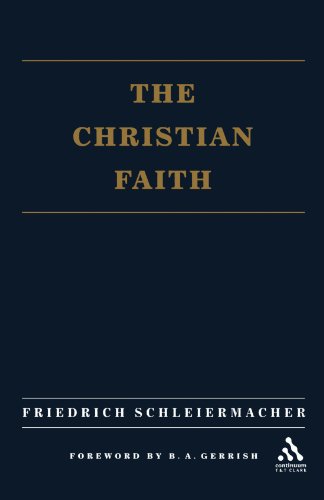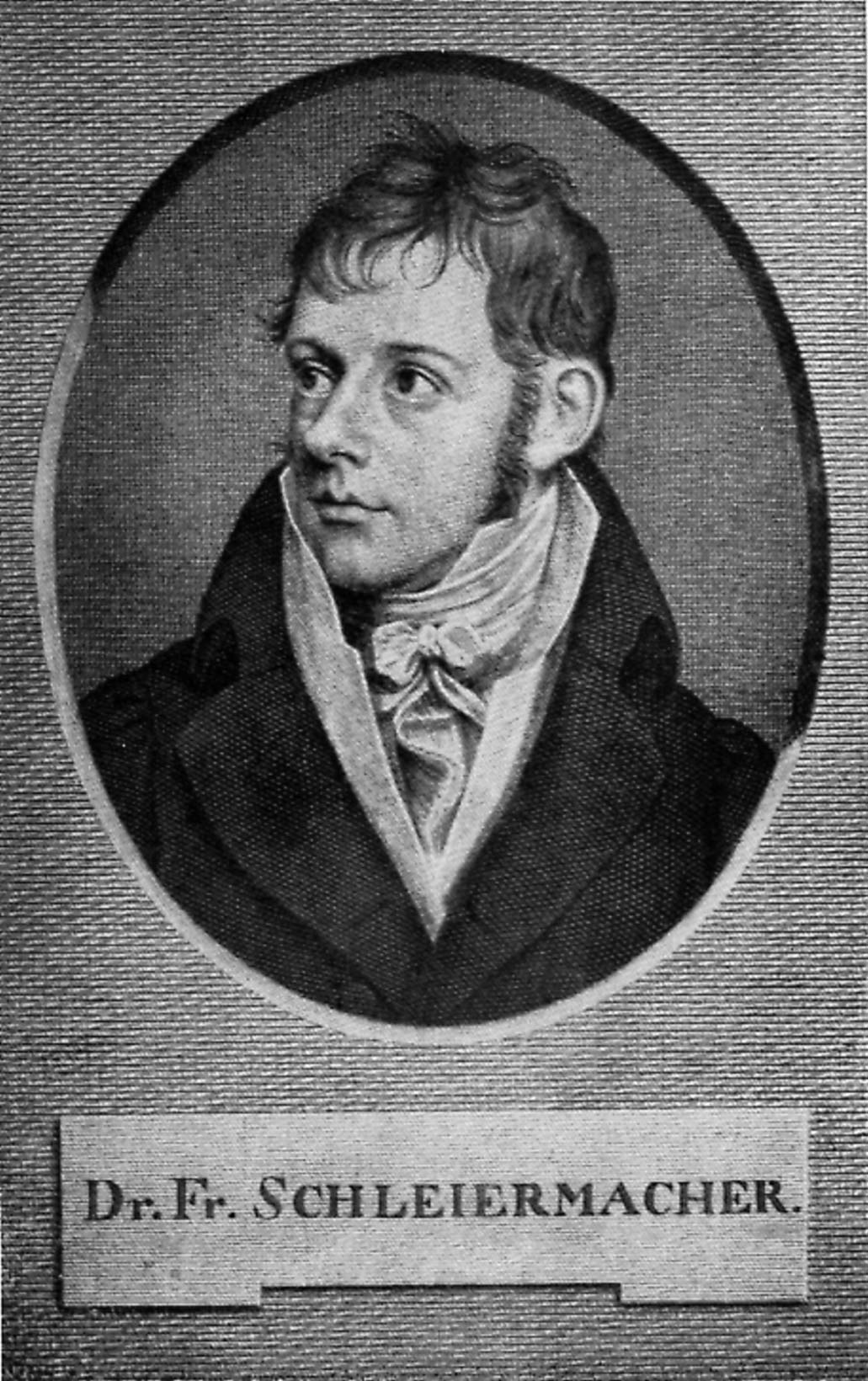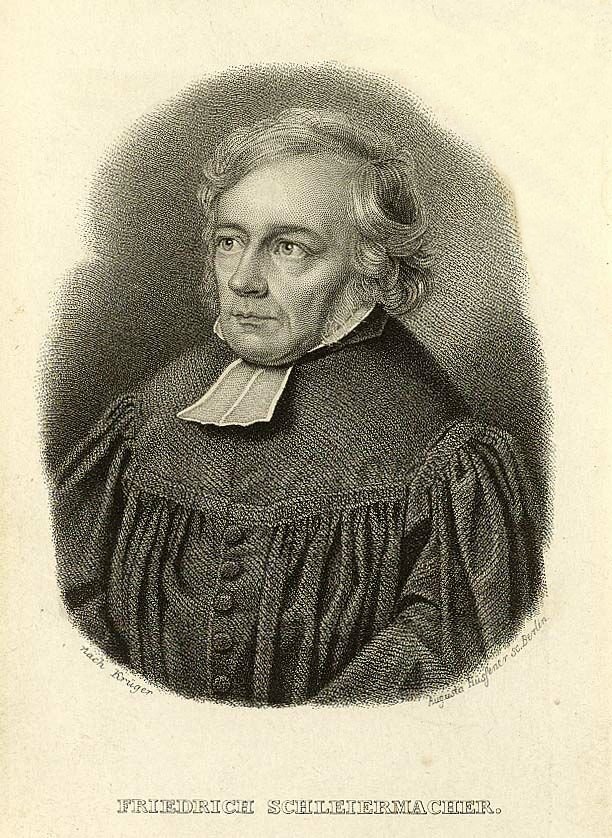 Oh, Schleiermacher! The most influential theologian of the last three hundred years, but who knows him by name? How do I begin to talk about Schleiermacher and what may I say? The place to begin is Friedrich Schleiermacher's magnum opus, "Der Christliche Glaube (Christian Faith)" first published in 1821-22. I read (and recommend) the T&T Clark Int'l 1999 edition that I struggled through last december, however there is a new cheaper reprint available from Apocryphile Press 2011 edition. The was the most difficult theology book that I've ever read: harder than barth, calvin or augustine, and maybe only matched by Edward's Ethical Writings (Vol 8 of Yale WJE Online).
Oh, Schleiermacher! The most influential theologian of the last three hundred years, but who knows him by name? How do I begin to talk about Schleiermacher and what may I say? The place to begin is Friedrich Schleiermacher's magnum opus, "Der Christliche Glaube (Christian Faith)" first published in 1821-22. I read (and recommend) the T&T Clark Int'l 1999 edition that I struggled through last december, however there is a new cheaper reprint available from Apocryphile Press 2011 edition. The was the most difficult theology book that I've ever read: harder than barth, calvin or augustine, and maybe only matched by Edward's Ethical Writings (Vol 8 of Yale WJE Online).
How do I talk positively about Schleiermacher without being hated by the conservative Reformed and having them accuse me of harboring Liberal Protestantism in my heart? My first answer is that B.B. Warfield called Schleiermacher a genius in his Studies In Theology, of which I read right before Christian Faith. Warfield's comments were what caused me to actually read Schleiermacher (and thanks to KCLS's interlibrary loan who saved me the $85 list price). I read ultimately read Christian Faith because of the infamy of Karl Barth's criticism of Schleiermacher. (But, was Barth actually a critic of Schleiermacher or really a disciple?) I'd also defend myself by saying that Schleiermacher thought his work was an asset to the Church, and an improvement on Calvin. His work was not written in hatred like the works of Ludwig Feuerbach and David Strauss. There are many times in Christian Faith when Schleiermacher veers at the last moment away from a strong heterodox position. Overall, this review will be a positive evaluation, granted that Schleiermacher is read critically and understood that his system is a failure due to his inherited system from Kant and Hegel. First, some background--
He was a German Theologian and a Pastor. It's a mystery, what kind of sermons did he preach? Especially since Schleiermacher has been wrongly accused of being an atheist. My friend Josh Hurd explained it best to me that Schleiermacher believed that his Christian Faith was a service to the church, and he was working out an improved Systematic Theology based on his belief in the veracity of Immanuel Kant and Georg Hegel criticisms of Christianity. I also suppose Christian Faith may be seen as an attempt to reconcile the Reformed and Lutheran Churches as well (as Barth made the same attempts.)
Here's a sample sentence from Christian Faith to demonstrate how hard it is to read:
"If we include in this mechanism all inferior life, animal and vegetable (since there can, in this conception, be no question of a universal life of the heavenly bodies), then free causes, by which we mean mean, are the sole finite causality, and it only needs one step to leave the divine causality as the only one, i.e. to hold what we have already shown to be destructive of the feeling of absolute dependence, and with it all piety--that men should regard themselves too as simply part of this mechanism, and should treat consciousness of self-activity as only an unavoidable illusions.", Friedrich Schleiermacher, Christian Faith I.49.1, pg. 190-191
Christian Faith begins with an important polemic of Knowing, Feeling, and Doing, where Schleiermacher explains that Feeling is Piety, and therefore Feeling is the realm of revelation of God because Feeling is the place where Experience encounters Knowledge, and therefore (here it comes...) where we really find and know and meet god is in our feeling of absolute dependence. I don't know if I am able to express this more profoundly other than by saying that Schleiermacher's God is actually defined as the feeling of absolute dependence. This short statement is the foundation of Schleiermacher's system and cannot be understated. And so, unless you read Christian Faith in this understand of God as a feeling of absolute dependence, it will be one long frustrating, misunderstanding and useless venture through the almost 800 pages.
Back to the prolegomena, Christian Faith is an apologetic book and an answer to pantheism or possibly deism of the Enlightenment. However, the books does not deny deism or pantheism, but rather it finds understanding by moving forward with Christianity as if God is inaccessible to us and as if we only have this vague feeling of absolute dependence to know God. If we are unable to say anything meaningful about God, we can turn our theology into anthropology and say something meaningful about God -- not by analyzing or scrutinizing God -- but rather by recognizing the inadequacies and failures of man, especially where all we have is our absolute feeling of dependence even if we do not know what we are dependent upon.
So, considering this prolegomena, the Trinity only appears an appendix with only a few pages dedicated to it at the end of the book. Jesus is not the God-man, but rather the man who exhibits a perfection of the feeling of absolute dependence. The Church becomes that which is entrusted with the feeling of absolute dependence from Jesus, that could not be fully received unless Jesus leaves us.
 I know all of this sounds like thick and deep heresy, and it is so, but the book is still a genius work (as B.B. Warfield called him) in understanding what Piety means. I suppose this is an indefensible position of praise, and maybe a contradiction in my theology. Maybe if I move on to Barth, it will help.
I know all of this sounds like thick and deep heresy, and it is so, but the book is still a genius work (as B.B. Warfield called him) in understanding what Piety means. I suppose this is an indefensible position of praise, and maybe a contradiction in my theology. Maybe if I move on to Barth, it will help.
Several of my friends has said that Barth said that the answer to Schleiermacher was to go through Schleiermacher. So in some regard this explains Barth tremendously, and shows why Barth is a great improvement over Schleiermacher, however there are some failures in Barth that are not in Schleiermacher, especially in regards to Schleiermacher's superior handling of Pelagianism and Manichaeism, and Schleiermacher's doctrine of Predestination.
So with Barth, if theology is actually anthropology, then that means that to do true theology means to understand theology as actually the theological anthropology of the man Jesus Christ alone: hence Barthian Christocentrism means we can only know God through man, that is, the man Jesus Christ. Voila! I've just explained Barth and Schleiermacher simply? (Hence Barth's rejection of Natural Revelation, etc.) God is only knowable through the man of Jesus Christ alone. So, I believe that Barth is not the end of this story, in terms of there's more to be said here, because what has been said is not enough but still very exciting. Hopefully there will be a link between Barthianism and Reformed Theology that unifies the church in the future.
Anecdotes from Christian Faith
Pelagianism or Manichaeism
Schleiermacher said that there are two great dangers of falling into either Pelagianism or Manichaeism. Pelagianism occurs when we deny that man has an evil nature and say that there is no evil. Manichaeism is when we elevate Satan to the level of God. In Manichaeism, there are two ultimate deities, one is a good God and the other is a bad God where all the good comes from the good God and all the bad comes from the bad God. Ying and Yang. The only solution is to understand that God is sovereign over all even evil intermediaries. This is where Schleiermacher triumphs over Barth, for his doctrine of Predestination is far superior to Barth's.
"For if we are too readily disposed to exclude sin from the range of our absolute dependence on God, we inevitably verge upon Manichaeism; while if we seek to reconcile it with the original perfection of man, we shall hardly avoid Pelagianism. It may, in fact, be said that in the development of the Church's doctrine there has been an almost constant wavering between these antagonistic positions." ~ Christian Faith 2.65.2
Calvin's Proof of Satan's Existence
Schleiermacher dismisses Satan as a non-entity, however in his discussion he reminded me of Calvin's proof of Satan's necessity in his Christian Faith 1.45.2 (henceforth CF). Schleiermacher points to Calvin's Institutes 1.14.17, yet calls this the best argument for the existence of Satan. The gist of Calvin's argument is that since God is absolutely sovereign and good, therefore he by necessity must have an agent or beings that are intermediaries to reconcile the fact that God is good yet evil exists. That being must desire to do evil for evil ends, but must be ordained by god for a chief and final good ends. The only alternate is to fall into Pelagianism or Manichaeism.
Inverting Scripture
A common exegetical tactic of Schleiermacher is to declare a clear passage to have an opposite meaning of the most plain reading. However, I wasn't able to quickly find a convincing proof. A quick search was his proof that angel's aren't real entities in CF I.43.1 by appealing to Zechariah 1:12 (which is a very trinitarian passage). Remember that Schleiermacher isn antitrinitarian.
"Then sthe angel of the Lord said, ‘O Lord of hosts, how long will you have no mercy on Jerusalem and the cities of Judah, against which you have been angry these seventy years?’" ~ Zechariah 1:12 (ESV)
Engaging with Calvin
It appears that Schleiermacher had a particularly high regard for Calvin and his Institutes, however he did view Calvin has deficient and hoped to improve upon Calvin. Here's a quote from the passage I quoted earlier that summarizes Schleiermacher's view of the Reformed Tradition:
"It was obviously from these two elements that the acute mind of Calvin composed his formulas, though they will not harmonize in one consistent view." ~ Schleiermacher, CF 1.45.2
In the preface was also this antagonistic comparison of Christian Faith to The Institutes of the Christian Religion:
"The editors of this translation, first published in 1928, agreed with the opinion of those best qualified to judge that as a comprehensive exposition of Protestant theology Schleiermacher's Christian Faith was second only to Calvin's Institutes. They were right--unless perhaps we prefer to reverse the order of first and second place or, better, are content to set these two theological masterpieces side by side without presuming to rank them." - B.A. Gerrish, 'John Nuveen Professor Emeritus, The University of Chicago' (CF, page v.)
God as Redeemer
Since I'm unable to reproduce the Christian Faith in this blog, I won't quote one of the many passages discussing God as Redeemer. If Redeemer is an attribute of God, its by necessity that God would create a world that needed his redemption, and this one of Schleiermacher's better arguments for predestination.
Other Works
On Religion:speeches to its cultured despisers and his Life of Jesus have received tremendous discussion. His Life of Jesus appears often in the books regarding the Quest for the Historical Jesus.
Final Anecdote
"For our mutual consolation I offer a historical reminiscence. Schleiermacher was struggling to finish the first draft of his Christian Faith, on September 7, 1822 he wrote to his friend Twesten: "Every time I see this book, I sigh at its bulk." I know that my own Dogmatics is already a good deal bulkier than Schleiermacher's Christian Faith. Yet Twesten's reply on March 9, 1823 might equally well be applied to my own book: "You complain about the size of your book, but do not worry; for most of us the size is indispensable to understanding, and the few who would perhaps have understood you from a lesser work will certainly accept with gratitude all the eluciations you want to give" (cf. G. Heinrici, D. August Twesten nach Tagebuchern und Briefen, 1899, p. 377, 379f.) Yes, for a right understanding and exposition there is need of a thorough elucidation. May it not be that I have been too short and not too long at some important points?" - Karl Barth, Preface to CD II/2, pg ix




Leave a comment